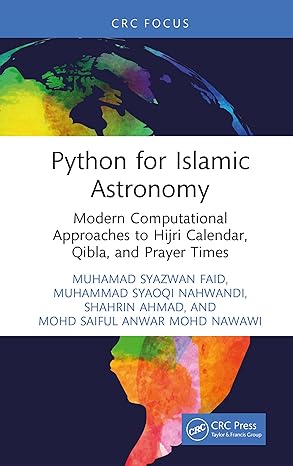
Python for Islamic Astronomy: Modern Computational Approaches to Hijri Calendar, Qibla, and Prayer Times
Author(s): Muhamad Syazwan Faid (Author), Muhammad Syaoqi Nahwandi (Author), Shahrin Ahmad (Author), Mohd Saiful Anwar Mohd Nawawi (Author)
- Publisher finelybook 出版社: CRC Press
- Publication Date 出版日期: November 7, 2025
- Edition 版本: 1st
- Language 语言: English
- Print length 页数: 198 pages
- ISBN-10: 1041082614
- ISBN-13: 9781041082613
Book Description
Python for Islamic Astronomy: Modern Computational Approaches to Hijri Calendar, Qibla, and Prayer Times responds to the urgent need to improve calculation accuracy and data visualizations in the field of Islamic Astronomy. This field is becoming increasingly complex, leading to mistakes in determining the beginning of the Hijri month, Qibla directions, and prayer times. This book offers a more precise approach by showing how the Python environment can be tailored for astronomical computations and how the mathematical principles behind Qiblah determination can be implemented through elegant Python algorithms. The guide provides detailed methodologies for calculating prayer times with astronomical precision, allowing for accurate scheduling regardless of global location. The book also delves into the science of moonsighting, helping readers learn to compute and analyze observation data critical for Islamic calendar determinations. Advanced visualization chapters bring these calculations to life through practical applications: develop your own Qiblah compass, create visual representations of the sun’s position during prayer times, and generate detailed lunar crescent visibility charts to aid in moon-sighting efforts. Perfect for programmers interested in Islamic Astronomy, religious scholars embracing technology, or anyone seeking to understand the mathematical foundations behind these traditional practices, this guide bridges ancient wisdom with modern computational techniques, making complex astronomical calculations accessible through the power of Python.
Key Features:
- The first book to provide practical guidance for using Python, supplemented by an interactive coding website, to solve real-world problems in the field of Islamic Astronomy.
- Uses the latest and most-trusted methods in Islamic Astronomy, ensuring all calculations are accurate and based on well-recognized references.
- Includes visualizations that help readers understand key topics like Qibla direction, prayer time zones, and lunar crescent visibility, making the content practical and user-friendly.
About the Author
Muhamad Syazwan Faid is a senior lecturer at the Department of Islamic Studies, Centre for General Studies and Co-Curricular, Universiti Tun Hussein Onn Malaysia (UTHM). His expertise lies at the intersection of Islamic Astronomy and computational sciences, where he integrates traditional Islamic astronomical practices with modern technological advancements.
Muhammad Syaoqi Nahwandi is a lecturer at UIN Syekh Nurjati Cirebon, where he specializes in Islamic Astronomy and its integration with modern scientific techniques. His academic focus includes lunar crescent visibility, prayer time calculations, and Hijri calendar determination.
Shahrin Ahmad is a renowned Malaysian astronomer and the founder of Falak Online, a platform dedicated to promoting Islamic Astronomy and public astronomy education. With extensive experience in observational astronomy, Shahrin is widely regarded as a leading figure in advancing understanding and application of Islamic astronomical practices.
Mohd Saiful Anwar Mohd Nawawi is an associate professor at the Department of Fiqh-Usul and Applied Sciences, Academy of Islamic Studies, University of Malaya (UM). A renowned scholar in Islamic Astronomy, he specializes in the development of methodologies for Hijri calendar determination, Qibla direction, and prayer time calculations.
 finelybook
finelybook
